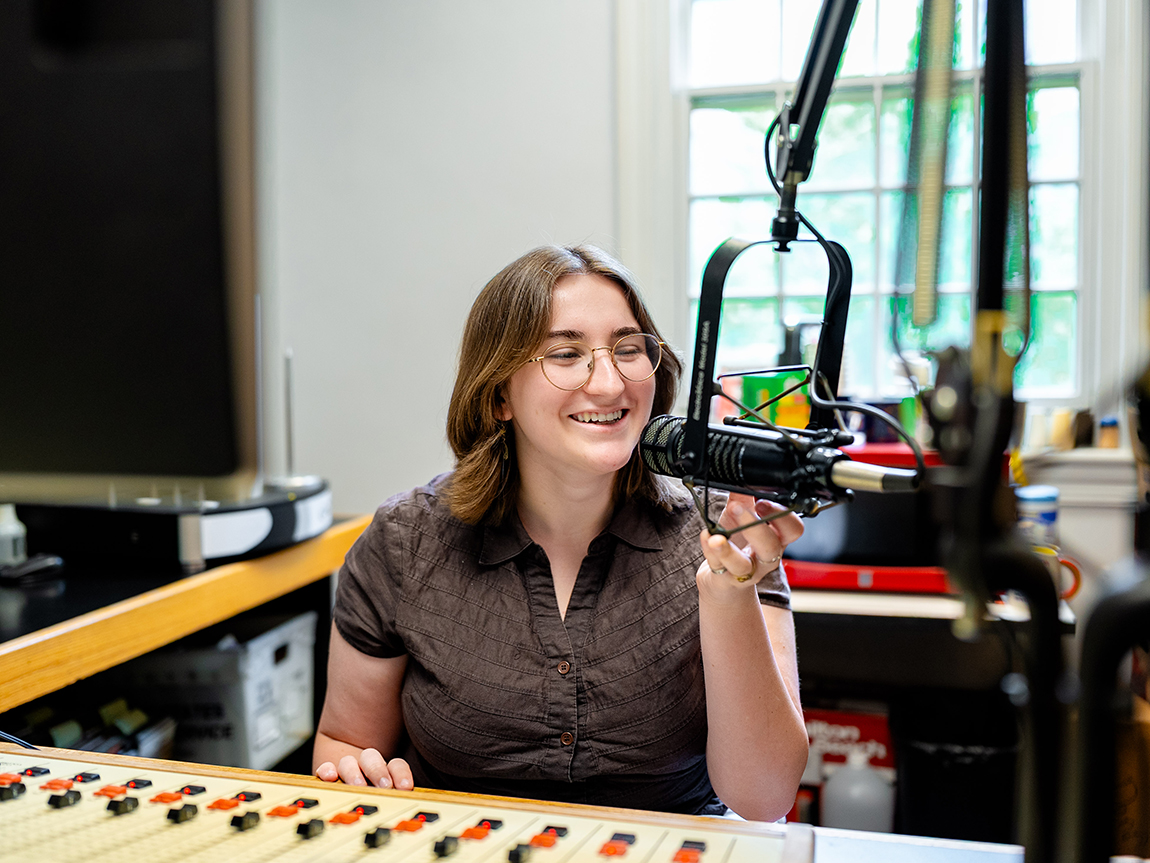Summer Research: Amy Swartz ’26 Examines Readers’ Assumptions About the Race of Fictional Characters
Swartz, an English and creative writing and political science double major, is conducting research that bridges both disciplines.Wednesday, July 16, 2025 11:26 AM
 Amy Swartz ’26 uses the WMUH studios to record interviews with participants in her study. Photo by Joe Romano ’23
Amy Swartz ’26 uses the WMUH studios to record interviews with participants in her study. Photo by Joe Romano ’23More than 70 Muhlenberg students are conducting research this summer — about 60 on campus, about 10 more remotely, and a handful of others through other institutions.
Research challenges students to apply what they’ve learned in the classroom, hone their discipline-specific skills, and make an impact in their field. Learn more about Muhlenberg’s transformative summer research program.
Amy Swartz ’26
Hometown: South Plainfield, New Jersey
Majors: English and creative writing and political science
Describe your summer research.
This project examines what assumptions readers make about characters when reading fictional texts. It aims to look specifically at race as the identity characteristic and to understand if and why readers make assumptions about the race of characters when the race of a character is left ambiguous. My research entails interviews with participants in which they read a short story and identify the identity markers they have given to a character, despite the lack of identity markers in the text. Then, I will examine the interview transcripts for insight into what assumptions are made along with the “why” behind them.
Throughout my research, I am taking into consideration how [each respondent’s] positionality within a larger racial majority or minority at Muhlenberg, as well as in their hometown, may influence how they interpret characters and what these discrepancies may mean. I want to examine how and why these assumptions and explanations of identity either coincide or diverge from their own identities based on their status in a racial majority or racial minority group and what larger socializations may also play a role in these assumptions.
“Research has become an integral part of my Muhlenberg experience and has expanded my perspectives on what I think to be true.”
Why are you interested in research generally and in this project specifically?
I have been [Assistant Professor of English and Writing Program Director Joshua] Barsczewski’s research assistant for the past year and a half. I was able to gain experience in English research — something I had never previously known was an option. The idea for this project came from scholarship I read for his research. It allowed me to ask questions about the implications of majority and minority identity groups in fiction — whether that be the identity of readers or the identities of characters on the page. Research has become an integral part of my Muhlenberg experience and has expanded my perspectives on what I think to be true. I’ve learned that no matter the discipline, there is always a “why” to be examined and a “why” that must be acknowledged.
What are the most challenging and rewarding parts of your research?
It was a challenge to come up with the interview questions I wanted to ask participants. It was difficult to ask questions in which they could give honest answers about their interpretations of the text while also ensuring the questions did not give away the basis for my study. It's been very rewarding to begin to hypothesize what can be done to attempt to combat these assumptions by better understanding how much of our assumptions are driven by our implicit biases. I hope to continue to do this as my research progresses throughout the summer.
“Though my research is grounded in English scholarship, I’m looking at my findings through the lens of both English and politics to understand these assumptions based on identity and sociocultural background. This research has reinforced that my future career goals can combine both disciplines.”
How is this experience shaping your understanding of what you want to do in the future?
As an English and political science double major, I’m always looking for ways that the two disciplines converge. Though my research is grounded in English scholarship, I’m looking at my findings through the lens of both English and politics to understand these assumptions based on identity and sociocultural background. This research has reinforced that my future career goals can combine both disciplines.
Swartz is also the incoming editor-in-chief of The Muhlenberg Weekly, an orientation team leader, a lead tutor in the Writing Center, the co-editor-in-chief for the Muhlenberg Academic Review, the new member educator for the Alpha Chi Omega sorority, as well as a member of the Sigma Tau Delta English honor society and the Pi Sigma Alpha political science honor society.
